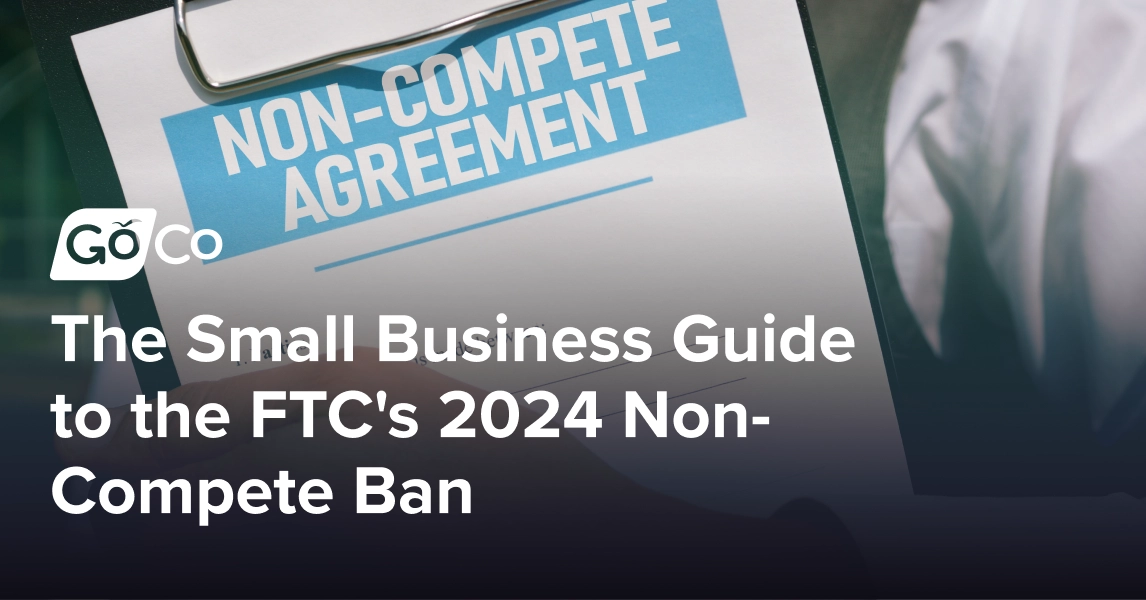The Small Business Guide to the FTC's 2024 Non-Compete Ban
The FTC's ban on non-compete agreements is set to go into effect on September 4, 2024. Here's what small businesses need to know.
by Anna Coucke - August 2nd, 2024
Update: On August 20, 2024, a federal judge in Texas found the FTC’s ban on non-compete agreements unlawful and issued a nationwide injunction. With this ruling, the ban will not go into effect in the near future, and further litigation is ongoing.
The Federal Trade Commission (FTC) has made a significant shift in labor policy with its new rule banning non-compete agreements for most workers. This sweeping change, set to take effect on September 4, 2024, has profound implications for businesses of all sizes, particularly small businesses.
What is a Non-Compete Agreement?
A non-compete agreement is a contractual clause that restricts an employee from working for a competitor or starting a similar business after leaving their current job for a certain period of time. These agreements have been a common tool for businesses to protect trade secrets, customer relationships, and other confidential information.
Historically, non-compete agreements were often used to maintain a competitive edge. For small businesses, they could serve as a barrier to entry for new competitors and help retain key employees. However, the FTC’s new rule effectively eliminates this practice.
Download the 2024 HR Compliance Calendar
How the Non-Compete Ban Effects Small Businesses
The ban on non-compete agreements presents challenges and opportunities for small businesses. On one hand, it may seem counterintuitive to lose a tool designed to protect business interests. On the other hand, it opens doors to a more dynamic and competitive marketplace.
Talent Acquisition: The most immediate impact is on hiring. Without non-compete restrictions, small businesses can cast a wider net for talent, attracting employees with more diverse skill sets and experiences and potentially boosting innovation and problem-solving capabilities.
Employee Morale and Retention: While non-compete agreements might seem like a way to retain employees, they can also foster resentment and stifle career growth. By removing this restriction, small businesses can create a more positive work environment, leading to increased job satisfaction and loyalty.
Increased Competition: A larger talent pool and freer movement of employees can intensify competition. This can drive innovation and force businesses to improve their products or services to stay ahead. While increased competition can be challenging, it can also lead to overall market growth.
Economic Growth: The FTC believes that banning non-competes will stimulate the economy by creating new businesses and increasing wages. While the full impact of the rule on small businesses remains to be seen, it could contribute to a more vibrant and entrepreneurial business landscape.
How Small Businesses Can Adapt
Traditionally used to protect confidential information and retain employees, losing non-compete agreements might seem like a loss for small businesses. However, this change presents exciting opportunities. In preparation for this upcoming change, small businesses should adopt strategies to protect their interests without relying on non-compete agreements.
Small businesses can tap into a wider pool of talent with diverse skills and experiences, potentially boosting innovation and problem-solving. Additionally, removing non-competes can foster a more positive work environment, leading to increased employee satisfaction and loyalty. While increased competition due to a freer talent pool might seem challenging, it can also drive businesses to improve their offerings and stimulate market growth. The FTC believes this will also lead to economic growth through the creation of new businesses and higher wages.
Small businesses that currently rely on non-compete agreements should explore alternative strategies to thrive in this new environment. Investing in employee and leadership development through training and establishing a strong company culture can make employees more valuable and less likely to leave. Intellectual property protection through patents, trademarks, and copyrights can be used to safeguard unique ideas, and clear and enforceable confidentiality agreements can protect sensitive information.
Final Thoughts
While the FTC's rule represents a significant change, it also presents opportunities for small businesses to become more agile, innovative, and competitive. By understanding the implications of the new rule and taking proactive steps, small businesses can position themselves for success in the evolving business landscape.
It's crucial for small business owners to stay informed about the specific details of the rule and consult with legal counsel to ensure compliance, particularly as some courts have begun challenging it as the effective date approaches. As the rule takes effect, additional guidance and resources may be available to help businesses navigate the transition.
Recommended Posts
Top 9 Employee Benefits Trends To Watch for in 2025
Blog Articles
Search...
Product
GoCo
Resources
Articles
eBooks
Webinars
Customer Stories




